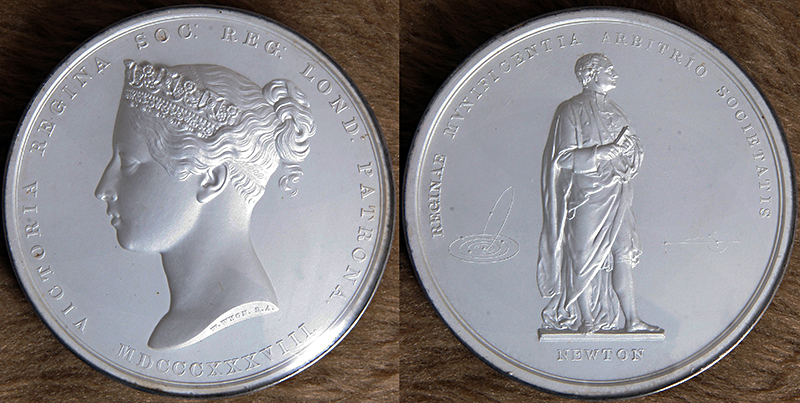
Wallace's frosted silver Royal Medal. Copyright Wallace Memorial Fund
On November 30th 1868 Wallace was awarded the first of the many prestigious awards he was to receive for his very important contributions to biology - the Royal Medal of the Royal Society of London. He was nominated by none other than his friend and admirer Thomas Henry Huxley, who once said of him: “Once in a generation, a Wallace may be found physically, mentally, and morally qualified to wander unscathed through the tropical wilds of America and of Asia; to form magnificent collections as he wanders; and withal to think out sagaciously the conclusions suggested by his collections...” [Huxley, T. H. (1863). Evidence as to Man's Place in Nature. London: Williams & Norgate. 159 pp.]
Interestingly, Darwin wrote to Hooker on 23rd September 1864 that "...it has occurred to me that a Royal Medal might before long be well bestowed on Wallace...", to which Hooker replied "What a good thought, of Wallace for Royal Medal I have been in despair for a good man, & here is one to our hands." Shortly afterwards Hooker back-tracked "I have been thinking of Wallace for Gold Medal R.S. but it seems to be half engaged to Dr Lockhardt Clark this year. How would you word Wallaces claims? Will it not be difficult to cite sufficient paper work?" (Hooker to Darwin, 26[–28] Oct 1864). Replying to Hooker's letter on 3rd November 1864 Darwin conceded:
"When I suggested Wallace for R. medal, I must confess I had obscure glimmering that it wd be difficult to state claims.His Amazon Book is nothing;his Nat. Selection would, I suppose, rather go against him with Royal Socy. I do not know whether his admirable paper before Linn. Socy. is published. He wrote one good paper on Geograph. Distribution & he has published Geographical papers; but I fear it would be impossible yet to make out good case. Talking of Geograph. Distrib. I have had a Prospectus & letter from Andrew Murray, asking me for suggestions! I think this almost shows he is not fit for subject, as he gives me no idea what his book will be, excepting that the printed paper shows that all animals & all plants of all groups are to be treated of!! Do you know anything of his knowledge."
Huxley was clearly more generous in his estimation of the importance of Wallace's work, although it is nice that the thought was there on the part of Darwin!
The President of the Royal Society, Edward Sabine, said the following about the award of the medal to Wallace in his Presidential Address of 1868:
"A Royal Medal has been awarded to Mr. Alfred Russell Wallace, in recognition of the value of his many contributions to theoretical and practical zoology, among which his discussion of the conditions which have determined the distribution of animals in the Malay archipelago (in a paper on the zoological geography of that region, published in the Proceedings of the Linnean Society for 1859) occupies a prominent place.
The case may be briefly stated thus : — The strait separating the islands of Baly and Lombok is only fifteen miles wide; nevertheless the animal inhabitants of the islands are widely different, the fauna of the western island being substantially Indian, that of the eastern as distinctly Australian.
Mr. Wallace has described, in a far more definite and complete manner than any previous observer, the physical and biological characters of the two regions which come into contact in the Malay archipelago; he has given an exceedingly ingenious and probable solution of the difficulties of the problem, while his method of discussing it may serve as a model to future workers in the same field.
Another remarkable essay, "On the tendency of Varieties to depart indefinitely from the Original Types," published in the Proceedings of the Linnean Society for 1858, contains an excellent statement of the doctrine of Natural Selection, which the author, then travelling in the Malay archipelago, had developed independently of Mr. Darwin; and, apart from its intrinsic merits, this paper will always possess an especial interest in the history of science, as having been the immediate cause of the publication of the 'Origin of Species.'
Mr. Wallace's ability as an observer and describer of animal forms is shown in his numerous and valuable contributions to our knowledge of the animals, and especially the Pigeons, Parrots, and Butterflies, of the Malayan region.
It must not be forgotten that a knowledge of the circumstances under which the majority of these contributions to the higher branches of zoological science were made must greatly enhance our respect for the author. Mr. Wallace has spent the greater part of his life amidst the exhausting and often dangerous fatigues of a traveller in tropical countries rarely explored by Europeans ; and some of his most valuable papers are dated from places which some might consider so little favourable to study as Ternate and Sarawak." (1868. Proceedings of the Royal Society of London, 17: 148).
